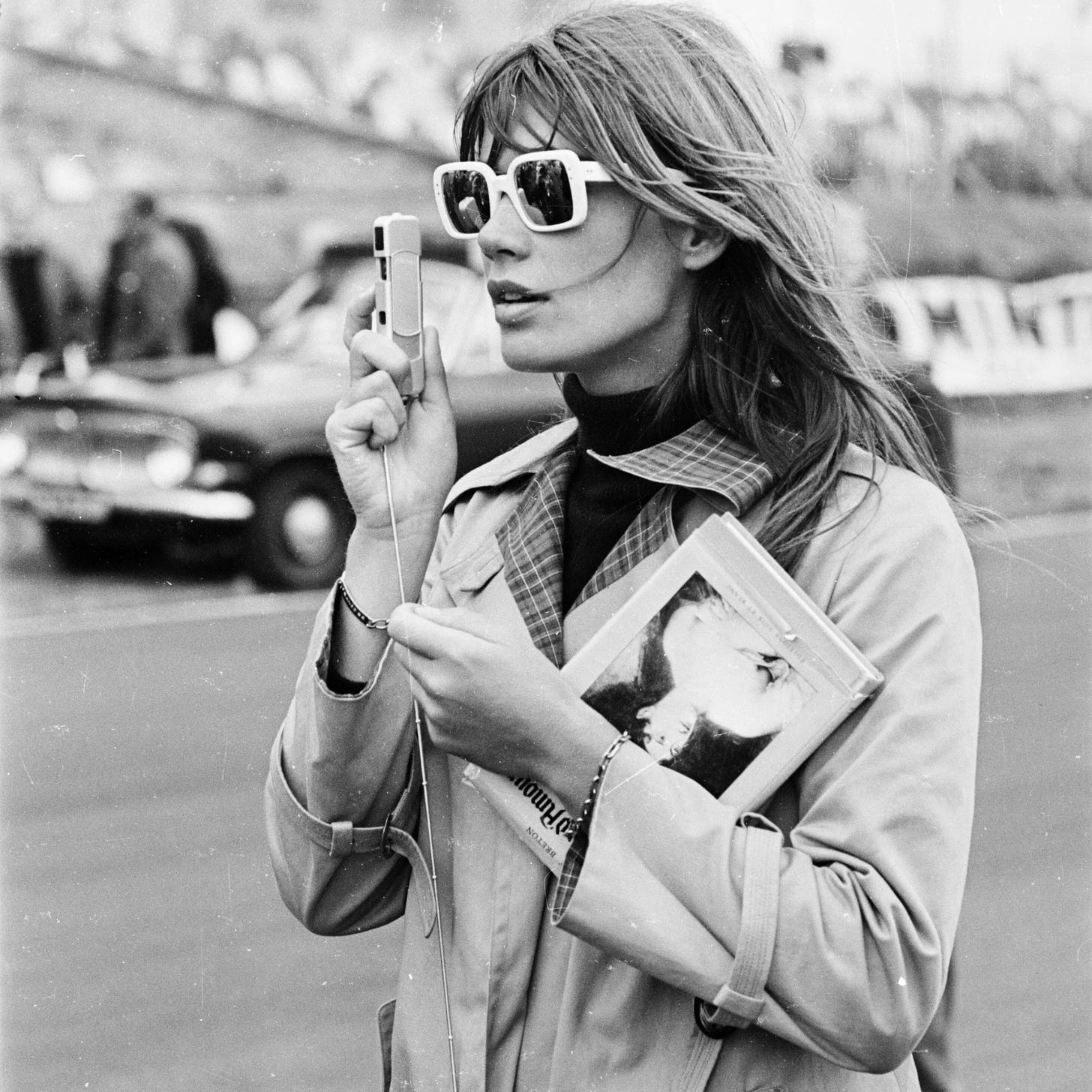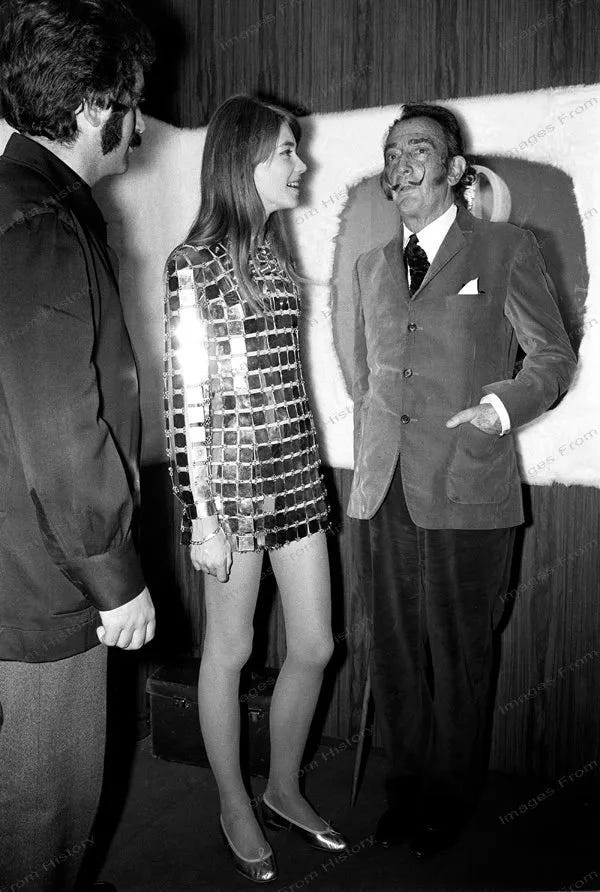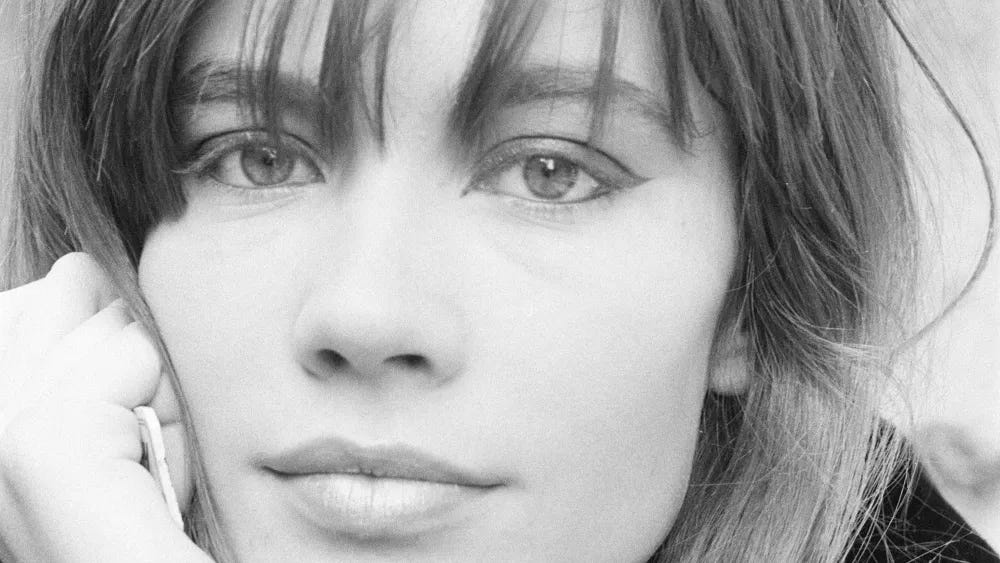
Françoise Hardy was the voice singing “I’ll Be Seeing You” with Iggy Pop on Jazz A Saint-Germain when I was 15. When I was 18, she was the 22-year-old girl in the white boots in Jean-Luc-Godard’s 1966 nouvelle vague film Masculin Féminin. I got white boots. I was late, or rather born late, but it didn’t matter - her style was eternal.
An icon she was also the greatest égérie at a time when there were many. She was André Courrèges’ with the boots, and then Chanel’s and Yves Saint Laurent’s and most famously Paco Rabanne’s in “The most expensive dress in the world”. But she was big for fashion in the 60s because she did haute coutre AND the new Ye-ye designers. She made bangs and boots and miniskirts hip and off the rack, especially for the Brits. In this way she had more of an impact on the way fashion developed than Bardot or Birkin or Twiggy and she was more interesting than they were too.
More than a mannequin, in song her style was rather like that of a French Nico, and she stood out in that even her Ye-ye pop was sort of muted, melancholy at times: "mais moi, je vais seule, par la rue la Montaigne...". She worked with Leonard Cohen and Serge Gainsborough but also Nick Drake and in later years Portishead and even Blur. Her best album was 1971’s La question.
Jean-Marie Perier was an early boyfriend, a photographer who has been described as “a veritable Pygmalion for the young singer”. A photographer will do but a painter is better, and Ovid and obsession are essential, I should know. And the painters soon came to Hardy, under her spell. Dali, but she was no Gala. She spent a week with Dali in Cadaqués in 1968, ate ortolans, and Perier took pictures.

In that same year she started up with Jacques Dutronc, whom she stayed married to in what I would consider a conventional set up; separated, a child, who really knows? but married on paper to the end. Of May ‘68 and Dutronc, she wrote: “We left for Corsica, where we spent several idyllic weeks – the first and last of our long and strange relationship.”
“My political awareness was nulle, and it was the same for Jacques.” They had no taste for political violence and believed it would solve nothing. She says of that month in her autobiography Désespoir des singes et autres bagatelles: “Contrary to things I’ve heard Daniel Cohn-Dendit say, May ’68 didn’t transform society; it was because society had already transformed that May ’68 could take place”. I would choose to holiday, too.
From the late 60s she continued to transfix artists and was immortalised by the likes of Bernard Buffet and Jean-Paul Goude. Her pop icon status was cemented by the very famous Guy Peellaert. Who was not taken by Hardy? Jacques Prévert and Manuel Vázquez Montalbán wrote her poems, but it was perhaps the boys—and they were boys—across the pond who are remembered as being the most besotted of all.

David Bowie, Mick Jagger, Bob Dylan, Brian Jones, even Morrissey were all infatuated, obsessed. Hardy’s Wikipedia page is so full of famous names that she almost gets lost, but this snatch of a story stands out because it is a reminder of how there are and will always be certain young women who “do not know their power” as certain older men are wont to remind them.
Bob Dylan was notably infatuated by the singer and included a beat poem dedicated to her on the back cover of his 1964 album Another Side of Bob Dylan. It begins: "for françoise hardy/at the seine's edge/a giant shadow/of notre dame/seeks t' grab my foot/sorbonne students/whirl by on thin bicycles/swirlin' lifelike colors of leather spin...". In 2018, Hardy told Uncut that two Americans had sent her several drafts of the poem that Dylan had left in a café, stating: "... I was very moved. This was a young man, a very romantic artist, who had a fixation on somebody only from a picture. You know how very young people are... I realised it had been very important for him."
Hardy was a myth, it was the 60s, and Dylan was indeed a romantic poet. Hardy was a diffident young woman, but in her later reflections she reveals herself as wise. What Sartre called ‘the gaze’ or ‘the look’ (le regard) often goes both ways when it comes to the sexes – that it does is magic and something missed by the feminists who insist on the eternally oppressive ‘male gaze’. They are still going on about that of course, but I note that for the new ones it comes with a fresh side of Marxism.
In 2020 Vogue Australia told us Françoise Hardy and BB are not to be romanticised, the children of Marx and Coca Cola are out, they were victims, and we are too if we fall into some olde world trap. The title of the article says it all: French-Girl Capitalism: why the myth of the ever-stylish Parisian woman is problematic. Inclusion, or some sort of freakshow DEI is apparently the new solution: “I think it’s also okay to say the Parisian is awesome, as long as you remind us that she is not necessarily born in Paris, she’s not French, she’s not just white, she can be handicapped, she can be poor.”
What a nightmarish vision. There is a reason I have not been to Paris for 6 years. I watch France 24 and cycle through old Éric Rohmer films from the safety of my flat in Budapest instead. Chain smoking, wearing a bob, short dresses, and boots. It’s the 60’s somewhere. Hardy’s look was not unlike that of Laurence de Monaghan in Rohmer’s Claire’s Knee. A moral tale, I might add, that is also far too nuanced for a #metoo world.
Françoise Hardy will be glad to be dead. Like BB she detested ‘political correctness’ and wanted a collection of some of her last writings to carry that title. It was taken, her publisher said, and it came out instead in 2015 as Avis non autorisés or Unauthorised Opinions.
But she will also be glad to be dead because she was ill for a long time, and she was in favour of euthanasia. She didn’t go out that way, but I remembered yesterday that Godard did, and that I wrote about him when he left. That was less than two years ago. A generation is leaving us, and one I note that many blame for our current state of decline. I don’t think they are to blame. They were terribly fun. But that many choose to go gently into that good night, I think I understand.
Bonne chance dans le ciel FH,
LS
Please subscribe! (posts are currently free)
If upgrading to a paid subscription is not your style you can throw me a 5 buck one-off tip here




Well researched and well crafted article Lana which I found very interesting informative Post war Europe had to re invent it self after the total destruction of countries cities and people and all the knowledge which it had accumulated. So your article to me reflects part of this process Thanks for sharing